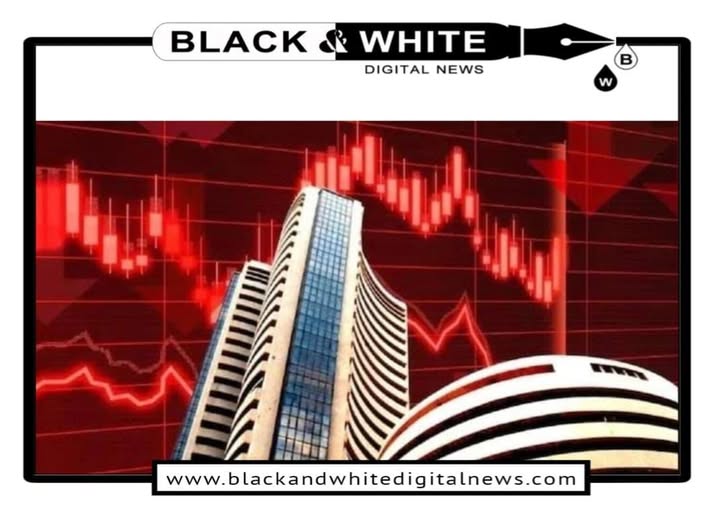Bloodbath on Dalal Street: Sensex Crashes 2,226 Points as Trump’s Tariff Tsunami
Triggers Global Market Meltdown.
||Black and White Digital News||
||Parvinder Singh April 07,2025 ||
Mumbai :The Indian stock markets were gripped by panic and fear on Monday as benchmark indices plunged in their steepest fall since June 2024, wiping out investor wealth worth trillions. Triggered by an escalating global trade war, ignited by fresh US tariff salvos, the Sensex nosedived 2,226.79 points (2.95%) to close at 73,137.9, while the Nifty50 tanked 742.85 points (3.24%) to end the session at 22,161.6 marking a day of carnage for Dalal Street.
The tremors were felt across the financial ecosystem, with total market capitalization of listed Indian companies shrinking by a staggering ₹33 trillion since March 2025, erasing nearly all the recovery gains made since the lows of September 2024. Since peaking on March 24, when optimism was buoyed by an 8% rally in indices, bears have returned with a vengeance, dragging the markets into a dark spiral.
Global Firestorm Fuels Local Destruction:
The dramatic fall was largely fueled by geopolitical tensions and a fresh round of economic aggression led by US President Donald Trump. The United States slapped a 54% tariff on Chinese exports, triggering an immediate retaliation by Beijing with 34% tariffs on all US imports. As if this weren’t enough, China further flexed its muscles by restricting exports of seven rare earths, launching anti-dumping probes into medical CT X-ray tubes from both the US and India, and blacklisting 16 American firms under export controls.
The backlash wasn’t limited to China. Canada imposed 25% retaliatory tariffs on US-made vehicles, and French President Emmanuel Macron urged firms to freeze investments in the United States, compounding global growth fears. These developments have not only heightened economic tensions but also deepened investor skepticism.
Sectors Slammed: IT and Metals Buckle:
Back home, the impact was immediate and brutal. IT and metal stocks bore the brunt, underperforming the broader indices due to fears of high inflation coupled with slower global growth, which may eventually spiral into a US recession.
Prominent metal giants Vedanta, Hindustan Copper, and Hindalco saw a jaw-dropping erosion of over 20% in market capitalization from their March highs. Tata Motors and Tata Steel were not far behind, each losing nearly 20% of their valuations. Even banking stocks failed to cushion the blow, with names like Central Bank of India, UCO Bank, and KPIT Technologies witnessing significant setbacks.
In the Nifty 500 universe, only 40 companies managed to register gains, with just 13 of them showing a rise of less than 1%. Among the few gainers, Tata Consumer Products rose 7%, while Aster DM Healthcare, BSE, and Vardhman Textiles saw gains of slightly over 10%—providing minor relief in an otherwise gloomy landscape.
Wall Street to Dalal Street: Ripple Effects and Warnings:
The collapse reflects a broader risk-off sentiment sweeping across global markets. While India’s direct exposure to the tariffs remains limited, analysts caution that the cascading impact on capex cycles, credit growth, and investor confidence could be severe.
BofA analysts, in their latest note, warned that India’s premium valuations now look vulnerable in a world where trade war tremors are rapidly mutating into a full-blown economic earthquake. “Given India’s rich valuations along with other concerns, we continue to stay cautious on Indian equities,” the report stated.
Looking Ahead: What Next for Investors?
With high volatility expected to persist in the near term, experts advise extreme caution. “We are entering uncertain territory where every global headline can shave off billions from the markets,” said a senior market strategist.
As of now, the Dalal Street bloodbath stands as a grim reminder of how tightly interlinked global economies are — and how fragile market optimism can be in the face of geopolitical brinkmanship. For Indian investors, the road ahead may well be turbulent, unless calm and cooperation return to the global trading table.



